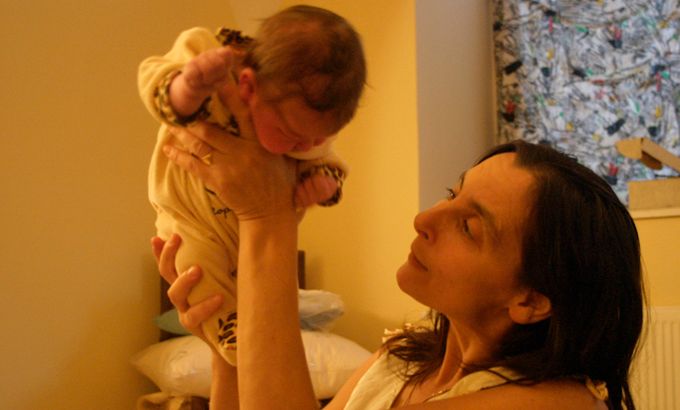
The battle over birth
A pioneering midwife takes on Hungary’s male-dominated medical profession in a bid to change approaches to childbirth.
Arrested for delivering a baby at home. It sounds far-fetched, but that is exactly what happened to Agnes Gereb, a celebrated Hungarian midwife and obstetrician.
After several years of bitter dispute between the Board of Gynaecologists and Obstetricians and Gereb, a proponent of natural birth practices, the midwife was arrested on October 5, 2010 on charges of malpractice.
Gereb worked for 17 years at the Albert Szent-Györgyi Clinical Center, at the University of Szeged in southern Hungary, after qualifying as an obstetrician in 1977.
Hungary was in the throes of a baby boom, as the women born in the first desperate years after the 1956 revolution began to have babies of their own.
“I attended births day and night during that time, sometimes as many as four in 24 hours,” Agnes told me.
By the time she resigned from the clinic in 1994, by her own calculations, she had attended an astonishing 5,500 hospital births.
Chemical births
As a woman in an overwhelmingly male-dominated profession, Gereb was upset by the high degree to which birth was medicalised, by the forced passivity of mothers, and by the all-too-frequent result – that birth was a frightening, negative experience in women’s lives, something to be endured and then, if possible, forgotten and hopefully never repeated.
Women were not allowed to walk around, eat or drink during their contractions. Neither were they permitted to find the position in which they felt most comfortable to give birth.
As a doctor, she recognised that the system was designed to make matters as easy as possible for the doctors, not for the birthing women; from the compulsory enemas when labour began to the administration of drugs to induce or speed up delivery and the fact that women were expected to lie on their backs in the position most painful to them but most convenient for the doctors.
The routine episiotomies to ease the passage for the baby’s head and the practice of expecting all obstetricians to carry out abortions as well as births troubled Gereb. And there were many abortions.
“Doctors often went into the room not knowing which it was to be next – death or life. That made them very cynical,” Gereb said.
A time of hope
Gereb began to fight for change from the inside; first by smuggling fathers into the clinic, against the rules of the hospital, to allow them to attend the birth.
This landed her a six-month suspension, but the director of the hospital later took credit for the pioneering move, claiming that his hospital was the first to ‘allow’ partners to be present at births.
It was while witnessing homebirths in the UK and US that Gereb realised births could be a happy, empowering experience without endangering the life of the mother or baby.
She also came to understand that many of the complications encountered during birth, which doctors are so proud of being able to treat, are actually caused by their earlier interventions – like speeding up the birth through the use of drugs, rupturing the membrane which surrounds the baby in the womb and the birthing position.
Realising that stress makes it difficult for a woman to give birth, Gereb trained and qualified as a psychologist, and came to understand birth as a psychological process, as well as a medical one.
In 1985 the World Health Organisation (WHO) published Appropriate Technology for Birth. It states: “It is not recommended that pregnant women be placed in a dorsal lithotomy (horizontal) position during labour and delivery … Systematic use of episiotomy is not justified … The induction of labour should be reserved for specific medical indications. No region should have rates of induced labour over 10 per cent.”
Encouraged by the WHO report and the midwives and doctors she had met abroad, Gereb cautiously began attending her friends’ homebirths.
It was a time of hope, communism had collapsed and everything seemed possible, including natural childbirth.
It was a time of great hope in my own life as well – my wife was pregnant with our first child. In January 1993, Samuel was born in our living room in Budapest, with Gereb’s expert care.
Shouting and singing
Our memories of that first birth, and of the four births which have followed it since, are intense.
In the intimacy of your own home, with the phone turned off, candle light and the scent of incense, it is a time of silence and soft words, of hot compresses, of walking and dancing, of shouting and singing, but above all of waiting and resting between the waves of contractions.
Gereb listens regularly to the baby’s heartbeat and checks on the baby’s progress. At one point, after many hours, she asks my wife if she would like to go into hospital. She explains that there is no medical reason for this, simply that she seems to be getting tired.
We are shocked. What else could we do, we ask?
“Haven’t you got any wine in the house?” Gereb asks.
A corkscrew is brought – not a usual aid at a birth – and my wife is given some of the red wine with which we had intended to celebrate the newcomer’s arrival to drink. A spoonful of honey follows. And a few minutes later, her strength miraculously restored, the contractions start again in earnest. The baby is born, wide-eyed, astonished, seemingly the most ancient as well as the newest person on the planet.
Gereb stays for an hour or two, and then disappears into the night. After some births she returns to her family, after others she moves on to the next delivery. Our first son was her 25th homebirth; our fifth son was her 2,500th.
By the time of her arrest, in October 2010, that number had topped 3,500.
And as in hospital, sometimes, though very occasionally, something goes wrong. Gereb continued to attend homebirths, but the clouds were gathering.
Life and death
In 2000, the first death associated with a homebirth in Hungary occurred. Several months after a baby was born without complications, it stopped breathing in its mother’s arms and suffered brain damage.
The hospital – not the baby’s parents – sued Gereb for negligence.
She was acquitted at the first hearing, but finally found guilty at the third and banned from practicing as an obstetrician for three years.
Having re-qualified as a midwife in 2005, Gereb continued to attend homebirths as a midwife, not as an obstetrician. The demand for her services was enormous – some 200 births a year.
In 2002, the Board of Obstetricians issued a statement explaining its continued opposition to home delivery. It argued that the conditions for it simply did not exist in Hungary.
The deaths of two more babies gave the medical authorities the chance they were looking for to rid themselves of a fellow doctor who challenged their power and, potentially, their source of income.
A series of prosecution cases were rolled into one and the charge against Gereb was increased to “manslaughter through professional negligence”.
As the court cases multiplied, the Hungarian media, initially sympathetic to what seemed to be a one-woman struggle against the old order, turned against her.
Hungarian journalists, even those working for respected newspapers, public service media and the state news agency, MTI, quoted at length from the interior ministry-approved experts marshalled by the prosecution against Gereb – despite the fact that the ‘experts’ – like most obstetricians in Hungary – were completely ignorant about homebirth, having never witnessed one.
Losing the battle, winning the war?
While Gereb waited for a verdict, Miklos Szocska, the state secretary for health, announced new regulations allowing homebirths with a skilled midwife in attendance. This will come into force this Spring.
The decision was announced on Gereb’s 58th birthday, when a crowd of about 500 people gathered outside the prison to sing her birthday wishes.
The regulation of homebirth is just the first step towards the establishment of midwifery as a separate profession with its own codes of practice working in close cooperation with the obstetric profession.
Gereb’s case, and the campaign for her release, finally persuaded the politicians, the public, the profession, and perhaps even the prosecutor, that homebirth and independent birth houses should be allowed in Hungary, and might even help further humanise hospital births. But the battle is far from over. On March 24, Gereb was sentenced to two years in prison. Her lawyers have appealed.
On my 18-year-old son’s bookshelf stands an empty wine bottle, whose contents we drank with Gereb in early 1993, to ease and finally celebrate his safe arrival among us.
Maternal health is about more than just mothers and babies. Across the globe the very business of delivering life into the world is determined by power, politics and, all too frequently, poverty. From rural Vietnam to urban America, Birthrights |
